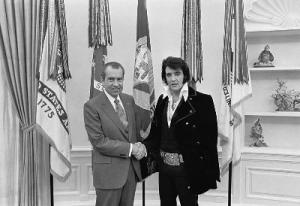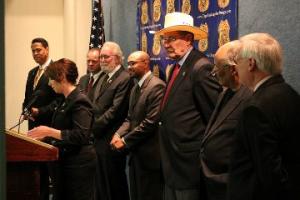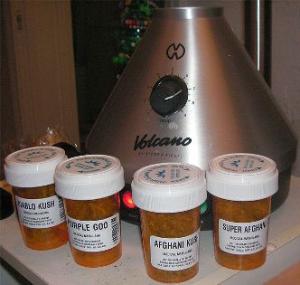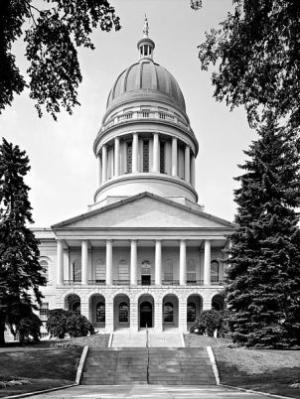To mark the 40th anniversary of Nixon's declaration of the war on drugs, Law Enforcement Against Prohibition has released a scathing report calling for it to end.
Last month a bipartisan group of US Representatives introduced three new bills to protect medical marijuana patients, providers and businesses. Please visit our action alert web site to take action in support.
Legalization is an important battle to fight for the country, but victory is not a foregone conclusion. Which way things go depends on the actions that YOU take at this point in time -- the future depends on you.
The US Supreme Court has ruled that the 1986 Anti-Drug Abuse Act means exactly what it says when it comes to "cocaine base."
The CNN Republican presidential debate tonight will include the self-destructing Newt Gingrich and the unannounced candidate Michelle Bachmann, but not announced candidate Gary Johnson.
Mexico's prohibition-related violence, with all its spectacular and horrifying brutality, continues unabated.
We've got it all this week: jail guards, police dispatchers, parole officers, big city narcs, small town deputies...
Your employer can fire you for a drug test result positive for pot even if you have a valid medical marijuana recommendation, the Washington Supreme Court has held.
Police and prosecutors in Indiana were violating the state constitution by failing to turn in seized funds to the school fund, so the legislature tried to fix it by saying they didn't have to. Now, the governor has done the right thing and vetoed that bill.
If Maine voters want to legalize pot, it looks like they're going to have to do it themselves. The legislature just punted on a chance to do it for them.
Camden, New Jersey, wants to shut down late night businesses in a bid to stop drug dealing.
Here's a shocker (not): No charges will be filed against the Tucson SWAT team that gunned down an ex-Marine in a drug raid in his home.
Events and quotes of note from this week's drug policy events of years past.
This week marks the 40th anniversary of America's contemporary war on drugs, and the country's largest anti-prohibitionist law enforcement organization is commemorating -- not celebrating -- the occasion with the release of report detailing the damage done. Members of Law Enforcement Against Prohibition (LEAP) hand-delivered a copy of the report, Ending the Drug War: A Dream Deferred, to the Office of National Drug Control Policy (the drug czar's office) Tuesday after holding a press conference in Washington, DC.

LEAP members pass by the White House as they deliver their report to the drug czar's office.
On June 17, 1971, President Richard Nixon (R) declared "war on drugs," and thousands of deaths, millions of arrests, and billions of tax dollars later, drug prohibition remains in place -- the Obama administration's declaration two years ago that it had ended the drug war in favor of a public health-centered approach notwithstanding. Ending the Drug War details how the war on drugs continues unabated, despite the recent administrations' less warlike rhetoric, and the ways it has hurt rather than helped drug users and society at large.
"When President Nixon declared the 'drug war' in 1971, we arrested fewer than half a million people for drug offenses that year. Today, the number has skyrocketed to almost two million drug arrests a year," said former Baltimore narcotics officer and LEAP executive director Neill Franklin. "We jail more of our own citizens than any other country in the world does, including those run by the worst dictators and totalitarian regimes. Is this how President Obama thinks we can 'win the future'?"
The report shows that despite the drug czar's nice talk about ending the drug war, Obama administration spending priorities remain highly skewed toward law enforcement and interdiction -- and it's getting worse, not better. In 2004, the federal drug budget was 55% for supply reduction (policing) and 45% for demand reduction (treatment, prevention). In the 2012 Obama budget, supply reduction has increased to 60%, while demand reduction has shrunk to 40%.
The report also demonstrates through arrest figures that on the street level, the drug war continues to be vigorously waged. In 2001, there were almost 1.6 million drug arrests; a decade later, there were slightly more than 1.6 million. Granted, there is a slight decline from the all-time high of nearly 1.9 million in 2006, but the drug war juggernaut continues chugging away.
"I was a police officer for 34 years, the last six as chief of police in Seattle," retired law enforcement veteran Norm Stamper told the press conference. "At one point in my career, I had an epiphany. I came to the appreciation that police officers could be doing better things with their time and that we were causing more harm than good with this drug war. My position is that we need to end prohibition, which is the organizing mechanism behind the drug war. We need to replace that system guaranteed to invite violence and corruption and replace it with a regulatory model," he said.

Nixon made Elvis an honorary narc in 1970. Nixon and Elvis are both dead, but Nixon's drug war lives on.
LEAP slams the Obama administration for its forked-tongue approach to medical marijuana as well in the report. The administration has talked a good game on medical marijuana, but its actions speak louder than its words. While Attorney General Holder's famous 2009 memo advised federal prosecutors not to pick on medical marijuana providers in compliance with state laws, federal medical marijuana raids have not only continued, but they are happening at a faster rate than during the Bush administration. There were some 200 federal medical marijuana raids during eight years of Bush, while there have been about 100 under 2 1/2 years of Obama, LEAP noted.
And LEAP points to the horrendous prohibition-related violence in Mexico as yet another example of the damage the drug war has done. The harder Mexico and the US fight the Mexican drug war, the higher the death toll, with no apparent impact on the flow of drugs north or the flow of guns and cash south, the report points out.
Sean
Dunagan, a recently retired, 13-year DEA veteran with postings in Guatemala City and Monterrey, Mexico, told the press conference his experiences south of the border had brought him around to LEAP's view.
"It became increasingly apparent that the prohibitionist model just made things worse by turning a multi-billion dollar industry over to criminal organizations," he said. "There is such a profit motive with the trade in illegal drugs that it is funding a de facto civil war in Mexico. Prohibition has demonstrably failed and it is time to look at policy alternatives that address the problem of addiction without destroying our societies the way the drug war has done."
Ending drug prohibition would not make Mexico's feared cartels magically vanish, LEAP members conceded under questioning, but it would certainly help reduce their power.
"Those of us who advocate ending prohibition are not proposing some sort of nirvana with no police and no crime, but a strategy based in reality that recognizes what police can accomplish in cooperation with the rest of society," said former House Judiciary Crime subcommittee counsel Eric Sterling. "The post-prohibition environment will require enforcement as in every legal industry. The enormous power that the criminal organizations have will diminish, but those groups are not going to simply walk away. The difference between us and the prohibitionists is that we are not making empty promises like a drug-free America or proposing thoughtless approaches like zero tolerance," he told the press conference.
Drug prohibition has also generated crime and gang problems in the US, the report charged, along with unnecessary confrontations between police and citizens leading to the deaths of drug users, police, and innocent bystanders alike. The report notes that while Mexico can provide a count of its drug war deaths, the US cannot -- except this year, with the Drug War
Chronicle's running tally of 2011 deaths due to US domestic drug law enforcement operations, which the report cited. As of this week, the toll stands at four law enforcement officers and 26 civilians killed.
It was the needless deaths of police officers that inspired retired Maryland State Police captain and University of Maryland law professor Leigh Maddox to switch sides in the drug war debate, she said.

LEAP's Leigh Maddox addresses the Washington, DC, press conference Tuesday.
"My journey to my current position came over many years and after seeing many friends killed in the line of duty because of our failed drug policies," she told the Washington press conference. "This is an abomination and needs to change."
While the report was largely critical of the Obama administration's approach to drug policy, it also saluted the administration for heading in the right direction on a number of fronts. It cited the reduction in the sentencing disparity for crack and powder cocaine offenses and the lifting of the federal ban on needle exchange funding as areas where the administration deserves kudos.
Forty years of drug prohibition is more than enough. Police are getting this. When will politicians figure it out?
back to top
On May 25, 2011, a bipartisan group of US Representatives introduced three new medical marijuana bills. H.R. 1983 would exempt people complying with state medical marijuana laws from federal arrest and prosecution. H.R. 1984 would protect banks accepting deposits made by medical marijuana dispensaries. And H.R. 1985 would allow the dispensaries to deduct business expenses on their federal taxes like any other business, putting an end to dozens of industry IRS audits already underway.
Please use our online web form to contact your US Representative and your two US Senators in support of these important bills. Please follow-up by calling their offices too -- if you don't know their numbers (or aren't sure who they are), you can reach them by calling the Congressional Switchboard at (202) 224-3121. And please use our tell-a-friend form that you'll find on the site after sending your letter to spread the word.
Click here to read the Chronicle report on these three bills -- and be sure to sign up for our email list while you're here, or paste our medical marijuana category feed into your RSS reader.
back to top

Dear Drug War Chronicle Reader:
Drug policy reform faces challenges and opportunities.
- States continue to enact medical marijuana laws, most recently Delaware, the 16th medical marijuana state; Vermont, a new medical marijuana dispensary state; and Maryland, with a new necessity defense bill that will study medical marijuana dispensaries.
- Nationwide support for legalizing marijuana is nearing 50 percent, and Congress will take up a legalization bill this year.
- States including Georgia, Oklahoma, Florida, Kentucky, Delaware, Ohio and many others are reducing drug sentences or considering it.
But the forces of prohibition aren't sitting still.
Please take a moment to support our organization with a generous donation. Your support will enable us to continue our publishing that informs, supports and builds the movement; to continue and expand our work with coalitions lobbying for drug policy reform, sentencing reform and ending collateral consequences of drug convictions; and to put plans in place supporting marijuana legalization initiatives coming up in as many as four states.
It is no exaggeration to say that the future depends on you. As Congressman Jared Polis told reformers at a recent gathering, this is an important battle to fight for the country, but victory is not a foregone conclusion: Which way things will go depends on the actions that you take today.
Thank you for supporting our organization and joining our call to end the failed and unjust drug war.
Sincerely,

David Borden, Executive Director
StoptheDrugWar.org
P.O. Box 18402, Washington, DC 20036
http://stopthedrugwar.org
P.S. We continue to offer a range of books, videos and other gift items as our thanks for your donations. See our online donation form for a current listing.
back to top
In a unanimous ruling Thursday, the US Supreme Court upheld a 10-year federal prison sentence for possession of cocaine base, rejecting an appeal that harsher penalties for crack cocaine did not apply to "cocaine base." The case was DePierre v. US, and it concerned the 1986 Anti-Drug Abuse Act, passed at the height of mid-1980s crack hysteria.

The Supreme Court says "cocaine base" means more than just crack. (Image via Wikimedia.org)
Under that law, possession of 50 grams of "cocaine base" was punishable by a 10-year mandatory minimum prison sentence, while it took five kilograms of powder cocaine (cocaine hydrochloride or "cocaine salts") to garner the same sentence. While those penalties have been imposed almost exclusively on crack cocaine offenders, the words "crack cocaine" do not appear in the law. Instead the harsher penalties are imposed on those who possess substances or mixtures containing "cocaine base."
Frantz DePierre got busted for selling more than 50 grams of "cocaine base" to an undercover agent in Massachuseets in 2005. At trial, a federal judge rejected his request to instruct the jury that "cocaine base" meant only crack cocaine, and a federal appeals court in Boston agreed with the trial judge. And now the US Supreme Court has endorsed those lower court rulings.
"Cocaine base," as used in the 1986 law, "means not just 'crack cocaine,' but cocaine in its chemically basic form," Justice Sotomayor held, as the court upheld DePierre's conviction and 10-year prison sentence. That basic form includes "the molecule found in crack cocaine, freebase, and coca paste," she continued. "On its plain terms then, 'cocaine base' reaches more broadly than just crack cocaine.
While Congress last year voted to substantially reduce -- although not eliminate -- the sentencing disparities between crack and powder cocaine, crack still earns you substantially more time than powder. And this ruling clarifies that those stiffer penalties apply to freebase and coca paste, as well as crack.
back to top
CNN held its first televised debate among Republican presidential candidates Monday tonight, but while the cable news network issued invitations to several non- or yet-to-announce candidates, it excluded one announced candidate who meets the criteria for inclusion. Former New Mexico Gov. Gary Johnson, an avowed and articulate opponent of drug prohibition, was not invited to participate, and his campaign and supporters are crying foul.

Gov. Gary Johnson -- you didn't see him on CNN for the debate. (Image via Wikimedia.org)
CNN, along with WMUR-TV and the Manchester Union-Leader, the debate cosponsors, set the bar for an invitation at the candidate having received an average of at least 2% in at least three national polls during the month of May.
According to the Johnson campaign, Johnson has met that hurdle, polling an average of precisely 2% in three national polls last month.
"It is our hope that CNN will review the criteria that has excluded two-term Governor Gary Johnson from the New Hampshire debate," said senior Johnson campaign advisor Ron Nielson on Saturday. "Now that this information has come to light, we look forward to receiving an invitation for Governor Johnson to participate."
But CNN didn't change its mind. Instead, the network presented front-runner former Massachusetts Gov. Mitt Romney, former Minnesota Gov. Tim Pawlenty, former House Speaker Newt Gingrich, Texas Congressman Ron Paul, Godfather's Pizza entrepreneur Herman Cain, non-announced candidate (until her announcement during the debate itself) Minnesota Congresswoman Michele Bachmann, and former Pennsylvania Sen. Rick Santorum.
Most of the invitations were well-justified. According to Real Clear Politics'
aggregate poll data (which also does not include Johnson) all of the invitees are above 2%, although Santorum, at 3.2% overall, only averaged 2.67% in three May polls. Up until debate time non-announced candidate Bachmann is averaging 5.1%, although that's a decline from her May poll average of 7%.
Still, why Johnson was excluded even though he has officially announced and meets the debate criteria remains a mystery.
CNN said it only wanted "serious" candidates with at least 2% of the vote, but also admitted it failed to include Johnson in its own polls.
Well, Republican-leaning drug reformers at least had Ron Paul to listen to.
(This article was published by StoptheDrugWar.org's lobbying arm, the Drug Reform Coordination Network, which also shares the cost of maintaining this web site. DRCNet Foundation takes no positions on candidates for public office, in compliance with section 501(c)(3) of the Internal Revenue Code, and does not pay for reporting that could be interpreted or misinterpreted as doing so.)back to top
by Bernd Debusmann, Jr.
Mexican drug trafficking organizations make billions each year smuggling drugs into the United States, profiting enormously from the prohibitionist drug policies of the US government. Since Mexican president Felipe Calderon took office in December 2006 and called the armed forces into the fight against the so-called cartels, prohibition-related violence has killed more than 38,000 people, including more than 15,000 last year. The increasing militarization of the drug war and the arrest or killing of dozens of high-profile drug traffickers have failed to stem the flow of drugs -- or the violence -- whatsoever. The Merida initiative, which provides $1.4 billion over three years for the US to assist the Mexican government with training, equipment and intelligence, has so far failed to make a difference. Here are a few of the latest developments in Mexico's drug war:

All the drug busts in Mexico seem to make no difference. (Image via Wikimedia.org)
In Morelia, Michoacan,
authorities discovered 21 bodies near the five main highway exits into the city. The men, all thought to be between 20 and 35 years old, were left alongside notes which identified them as petty criminals and warning others. Some of the bodies were reported to show signs of torture. Morelia is the hometown of President Calderon.
In Hidalgo County, Texas,
at least three suspected drug smugglers were wounded after a fire fight with US law enforcement officers along the Rio Grand. The officers were apparently trying to intercept a large drug shipment when they came under fire from the Mexican side of the border.
In Ciudad Juarez,
a peace march led by Mexican writer and poet Javier Sicilia arrived in the city with about 1,500 followers. The march left from Cuernavaca on June 5. In late March, Javier Sicilia's son was killed near Cuernavaca alongside several friends.
Also in Ciudad Juarez
, nine people were murdered in several incidents across the city, making it the most violent day in the city so far in June. In one incident, two men were killed after their vehicle was attacked by gunmen armed with assault rifles.
Saturday, June 11
In the small town of El Terrero, Chihuahua, five
members of a family were gunned down by a group of gunmen. Witnesses later reported that the men came searching for another target, and that the family was killed when they said they didn't know where he was. Two of the dead were children aged 3 and 4.
Sunday, June 12
In the municipality of General Teran, Nuevo Leon,
three mutilated and dismembered bodies were found at the main entrance to the town. The dead are presumed to be members of the Gulf Cartel, as two banners signed by the Zetas were left at the scene threatening Gulf Cartel leaders M3 (Samuel Flores-Borrego) and R1 (Juan Reyes Mejia Gonzalez). In January, two police officers in General Teran were kidnapped and killed in a similar fashion, which lead to the town's entire police force quitting.
Monday, June 13
In the city of Chihuahua,
a police commander was shot and killed after leaving a hospital, where he had been treated after being wounded in another attempt on his life earlier that day.
In Monterrey,
a man was hung from a bridge and set on fire. Hundreds of motorists and pedestrians were in the area to witness gunmen arriving at the bridge, douse the victim in flammable liquid and throw him over the side of the overpass. The same bridge was the scene of a similar crime the previous Wednesday, in which gunmen hung two men.
Tuesday, June 14
In Tijuana,
former Mayor Jorge Hank Rhon was cleared of federal weapons charges, but was immediately taken into state custody without charges as investigators seek to collect evidence for a murder trial. According to Baja California authorities, at least two weapons of the many that were recovered from his house have been used in homicides.
In the United States,
an unnamed State Department official confirmed that at least one American citizen was among the 193 bodies recovered from mass graves in the San Fernando, Tamaulipas area in April.
[Editor's Note: We cannot accurately tally the drug prohibition-related killings in Mexico at this time. El Universal, the only Mexican newspaper that was doing so on a regular basis, has stopped. We will have to rely on official pronouncements on the death toll, and will report them when they happen. Below are the numbers through the end of last year. With more than 1,400 reported dead in April alone, this year's toll could well exceed last year's. As of this month, we believe the total death toll has surpassed 38,000.]
Total Body Count for 2010: 15,273
Total Body Count for 2009: (approx.) 9,600
Total Body Count for 2008 (approx.): 5,400
Total Body Count for 2007 (approx): 4,300
Total Body Count for Calderon's drug war through 2010: 34,883
back to top
We've got it all this week: jail guards, police dispatchers, parole officers, big city narcs, small town deputies... Let's get to it:
In Edgard, Louisiana,
a St. John the Baptist Parish jail guard was arrested June 8 after a sheriff's office investigation found he was smuggling drugs to inmates in the parish jail. Allen Meadows, 41, went down after the sheriff's office got tipped off he was smuggling dope, and that's all the sheriff will say so far. He was charged with malfeasance in office and four counts of trafficking contraband to a correctional institution. A search of his home in neighboring St. Charles Parish resulted in additional charges of possession with the intent to distribute marijuana, possession of drug paraphernalia, and possession of cocaine. He was jailed on a $20,000 bond. And he's now a former jail guard -- he was fired after being arrested.
In Virginia Beach, Virginia,
a Norfolk police officer was arrested June 9 on charges he was peddling steroids and marijuana. Officer Kristen Wayne Harris is charged with 10 counts of manufacturing or selling steroids and one count of selling pot. He also faces misdemeanor charges of selling or intending to sell drug paraphernalia and assisting an individual in unlawfully procuring a prescription drug. The offenses allegedly occurred on various dates in the last three months.
In Harrisburg, Pennsylvania,
a former state parole officer was arrested June 9 for allegedly asking for bribes from parolees to overlook positive drug tests or not administer the tests and for not incarcerating them when they violated parole. Kenneth Dupree, 46, is also accused of using threats of incarceration to extort and intimidate parolees into giving him money. It's not clear what the formal charges are.
In Lawrenceburg, Tennessee,
a Lawrence County jail guard was arrested last Friday after being accused of getting paid $25 to smuggle packages of pills, pot and tobacco to inmates at the jail. Adam Cozart, 24, went down after deputies were tipped by at least three inmates that he was bringing contraband into the jail. They waited for him and confronted him when he came to work, and Cozart admitted having a package for two inmates. It contained four Percocet tablets, a small amount of weed, and tobacco. He is charged with two counts of introduction of contraband into a penal facility, possession of marijuana, possession of a controlled substance, and possession of drug paraphernalia. He was booked into a neighboring county jail.
In Krotz Springs, Louisiana,
a Krotz Springs Police dispatcher was arrested Monday after she allegedly released two jail inmates from their cells, helped them break into the department evidence room, and then shared stolen drugs with them. Dispatcher Amanda Nall, 23, went down after the department reported a burglary to the St. Landry Parish Sheriff's Office. Sheriff's investigators say Nall released the two inmates, then shut off the lights near the evidence room in a bid to thwart security cameras while one of the inmates broke into the evidence room and stole the drugs, which he and the other inmate shared with Nall before returning to their cells. Nall is charged with malfeasance in office and simple burglary, while the inmates are charged with simple burglary.
In McAllen, Texas,
a former Hidalgo County Sheriff's deputy pleaded guilty June 9 to trying to sell confiscated marijuana to informants in other cases. Omar Salazar copped to federal counts of marijuana possession and conspiracy to possess marijuana. He also faces state charges in the scheme that surfaced during a raid at a stash house in Mission in 2009. He's looking at up to 40 years on the federal charges. No sentencing date has been set.
In Jacksonville, Georgia,
a former Appling County sheriff's deputy pleaded guilty June 9 to tipping off a suspected marijuana trafficker to an impending raid by a joint narcotics task force in January. Richard Crosby, 36, was present during a planning meeting for the raid, which was the culmination of a months-long undercover operation, and he admitted that he passed word to the target through a second person to stay away from home the following day because a raid was coming. He pleaded guilty to being an accessory after the fact to the distribution of controlled substances, marijuana. He faces up to 2 1/2 years in prison and a fine up to $250,000. He is out on bail pending sentencing.
In Tulsa, Oklahoma,
two Tulsa police officers were cleared and one former office was found guilty Monday in a complex federal case involving accusations of drug distribution, stealing money during an FBI sting, and planting drugs on people. Officer Bruce Bonham, 53, and Officer Nick DeBruin, 38, were acquitted on all the counts against them. Retired Cpl. Harold R. Wells, 60, was found guilty of drug conspiracy, carrying a firearm during drug trafficking and stealing US funds during the FBI sting. He's looking at a mandatory minimum 15-year prison sentence, and he was ordered taken into custody upon the reading of the verdict. Bonham and DeBruin walked despite video surveillance footage of them and Wells splitting up and pocketing cash during the sting.
back to top
Employers in Washington state can fire employees who fail a drug test, even if they have a valid recommendation to use medical marijuana, the state Supreme Court ruled Thursday. The ruling came in the case of a Bremerton woman who was fired from her job after testing positive for pot, although she had a recommendation to use marijuana for migraine headaches.

Taking prescribed Adderall, Oxycontin, or Vicodin? No problem. But medical marijuana can get you fired. (Image via Wikimedia.org
In the case,
Jane Roe v. TeleTech Customer Care Management, the anonymous plaintiff was pulled out of a training class and fired in October 2006 because she failed a pre-employment drug test. Her attorney argued that the Washington state medical marijuana law implicitly required employers to accommodate medical marijuana use outside the workplace.
But in an 8-1 decision, the state Supreme Court disagreed. The majority noted that the state law explicitly allows employers to forbid on-the-job medical marijuana use, but says nothing about medical marijuana use outside the workplace.
"We hold that [the Washington Medical Use of Marijuana Act] does not provide a private cause of action for discharge of an employee who uses medical marijuana, either expressly or impliedly, nor does MUMA create a clear public policy that would support a claim for wrongful discharge in violation of such a policy," wrote Justice Charles Wiggins for the majority.
But in his
dissent, Justice Tom Roberts noted that under the medical marijuana law, qualified patients "shall not be penalized in any manner, or denied any right or privilege, for such actions." Roberts added that, "Roe seems to be exactly the sort of person the people intended to protect... Neither I nor the law would require employers to employ drug impaired workers. The law is intended to treat marijuana like any other medication."
If the state high court will not protect the rights of Roe, Roberts wrote, the legislature should step up and do so. "To that end, I urge the legislature to thoughtfully review and improve the act."
But that's no easy process. In California, which has seen a similar state court ruling gutting the employment rights of medical marijuana users,
a legislative effort to provide a fix died in Sacramento last week.
back to top
A bill that would have given 90% of the proceeds from seized cash and goods to local prosecutors and law enforcement agencies involved in the case has been vetoed by Gov. Mitch Daniels (R). The remaining 10% would have gone to the Common School Fund.

Indiana Gov. Mitch Daniels (R) has vetoed a smelly asset forfeiture bill. (Image courtesy state of Indiana)
Under the Indiana constitution, all proceeds from seized items must go to the Common School Fund, but county prosecutors and law enforcement agencies have found
several means of skirting the law. Some county prosecutors have contracted out asset forfeiture cases to private attorneys, leading to lucrative pay-outs to lucky litigators. Others have claimed ludicrous law enforcement "expense of collection" costs to justify keeping hold of their looted lucre.
In vetoing
Senate Enrolled Act 215, Gov. Daniels said paying out 90% of every forfeiture dollar to police and prosecutors for "expense of collection" was improper. "That is unwarranted as policy and constitutionally unacceptable in light of the Supreme Court's recent guidance and the plain language of Article 8, Section 2 of the Indiana Constitution," Daniels said in his
veto message.
On April 27, the state Supreme Court reaffirmed that asset forfeiture funds must be paid to the Common School Fund. But two days later, the Republican-led General Assembly voted to approve the change in asset forfeiture distribution anyway.
Now, Gov. Daniels has stood up for Indiana schoolchildren -- and the rule of law -- in the face of the law enforcement lobby and despite the wishes of his own Republican peers.
back to top
The Maine House voted overwhelmingly Tuesday to reject a bill that would have brought the state closer to legalizing marijuana for recreational use. The bill failed on a vote of 107-39.

The Maine state capitol. There is no joy for pot fans in Augusta this week. (Image via Wikimedia.org)
Introduced by Sen. Diane Russell (D-Portland), the bill,
LD 1453, would have legalized the possession and cultivation of marijuana for personal use and placed a 7% tax on pot sales. But the bill was amended in committee to propose a statewide voter referendum on the issue and to add a caveat that it would not take effect until marijuana was legal under federal law.
Even that watered down version of the bill was too much for opponents.
"I don’t believe the time has come yet for this," said Rep. Michael Celli (R-Brewer) during debate. "We have to let the federal government make the first move."
Supporters of the measure argued in vain that Maine was wasting $26 million a year enforcing the pot laws and that citizens should at least be given the chance to decide the issue. They also disputed statements by opponents that pot is a "gateway drug."
"It is time to stop turning law-abiding people into criminals," Russell said.
Not all Republicans opposed the bill. Libertarian-leaning Rep. Aaron Libby (R-Waterloo) said the federal government is trampling on states' rights and the constitution.
"We should follow the constitution and stop trying to police moralities," Libby said.
That's not going to happen this year, though. The same day the House rejected the bill, it went to the Senate, which concurred with the House vote. The bill is now dead for the session.
back to top
Camden, New Jersey, is about to force businesses to close down during late-night hours in a bid to reduce street-level drug dealing. An earlier version of the plan targeted only take-out restaurants, but the current version would allow only gas stations and bars to stay open, and the gas stations could only sell gas, not food or any other items.

The mean streets of Camden. And they think late-night Chinese joints are the problem? (Image via Wikimedia.org)
In remarks reported by the
Philadelphia Inquirer, city officials said the earlier version of the plan was tabled over fears it discriminated against the take-out restaurant. Under the new proposal, McDonalds and the local Chinese take-out would have to play by the same rules, they said.
"When you get into exemptions, where do you stop?" said City Attorney Mark Riondino. "That's where we got into problems" with the earlier version.
The move is a bid to reduce drug dealing in the poverty-stricken, crime-ridden city. Neighborhood leaders complained that some late-night take-outs attract more people seeking drugs than Chinese food or fried chicken, especially along Mount Ephraim Avenue, in one of the city's tougher neighborhoods.
Police say that drug customers from neighboring towns often become crime victims near the late-night establishments. They cited two cases of car theft at gun or knife-point in recent weeks in the 1500 block of Mount Ephraim Avenue, where a Crown Fried Chicken and a handful of Chinese take-outs have late-night hours.
But the owner of Crown Fried Chicken, which is open 24 hours, said the proposed business curfew was bad news. "This is very bad for us, for the business, and very bad for Camden," said Ali Khan.
When asked if crime was a problem outside his restaurant, Khan acknowledged that the streets of Camden can be tough, but said it wasn't his restaurant's fault. "There are a lot of situations in Camden," he said. "Before Crown Chicken, was there no crime, no shootings?"
The Camden City Council will vote on the proposal Tuesday, but it's difficult to see how curbing businesses in a recession-wracked city is going to help anything.
back to top
The Pima County Sheriff's Department SWAT team that gunned down a former Marine in his Tucson home during a raid in which no drugs were found was cleared Tuesday of any wrongdoing in the incident. The victim, Jose Guerena, 26, died in a hail of bullets in his underwear in a hallway of his home as he responded gun in hand to his wife's report of armed intruders.

Jose Guerena
SWAT team members coming through his front door fired at least 70 rounds at Guerena, striking him at least 21 times. Guerena never fired a shot. The SWAT team prevented emergency medical teams from treating him for more than an hour. He was pronounced dead shortly thereafter at a local hospital.
Pima County Chief Criminal Deputy Attorney David Berkman said in a report issued Tuesday that the SWAT team members were justified in using deadly force because Guerena pointed his weapon at them.
"A close examination of the rifle revealed it appeared to have been damaged by being fired upon from such an angle that it must have been pointed toward officers," Berkman wrote. "The officers were mistaken in believing Mr. Guerena fired at them. However, when Mr. Guerena raised the AR-15 semi-automatic assault rifle in their direction, they needed to take immediate action to stop the deadly threat against them."
The report did not delve into how the SWAT team could mistakenly think it was being shot at, nor did it address the fact that no one has been arrested in the series of raids that took place the day Guerena was killed. Police found weapons and body armor in the ex-Marine's home, but those are legal items. The report also did not note the role that the choice to use SWAT when entering the home played in creating the situation.
In
statements to investigators after the raid, SWAT team members said the raid on Guerena's home was part of a probe into "possible drug running, home invasions, and potential homicides."
But the only actual -- as opposed to potential -- killing has now been ruled not a homicide. Jose Guerena died at the intersection of Second Amendment rights and paramilitary policing. He isn't the first, and he certainly won't be the last.
back to top
June 19, 1812: The United States goes to war with Great Britain after being cut off from 80% of its Russian hemp supply. Napoleon invades Russia to sever Britain's illegal trade in Russian hemp.
June 17, 1971: President Nixon declares war on drugs, calling drug abuse "public enemy number one in the United States" in a press conference, announcing the creation of the Special Action Office for Drug Abuse Prevention (SAODAP), to be headed by leading methadone treatment specialist Dr. Jerome Jaffe. [Historical Note: During the Nixon era, for the only time in the history of the war on drugs, the majority of funding went toward treatment rather than law enforcement.]
June 18, 1986: The evening death (heart failure from cocaine poisoning) of promising college basketball star Len Bias, a recent Boston Celtics draft choice, stuns the nation and leads to enactment by Congress (without hearings) of draconian mandatory minimum sentences.
June 19, 1991: In a secret vote, the Colombian assembly votes 51-13 to ban extradition in a new Constitution to take effect on July 5. The same day Pablo Escobar surrenders to Colombian police.
June 20, 1995: On a Discovery Channel special, "The Cronkite Report: The Drug Dilemma," former CBS news anchorman Walter Cronkite calls the drug war a failure and calls for a bipartisan commission study alternatives to prohibition, concluding, "We cannot go into tomorrow with the same formulas that are failing today."
June 16, 1999: Testifying before the Criminal Justice, Drug Policy and Human Resources panel of the House Government Reform Committee, ACLU executive director Ira Glasser tells lawmakers that the most effective way to control drug abuse is through regulation, not incarceration.
June 18, 2002: The Supreme Court rules that in conducting random searches for drugs or weapons on buses, police need not advise passengers that they are free to refuse permission to be searched.
June 20, 2002: Rolling Stone magazine reports that the Senior Judge of England's highest court, Lord Bingham, publicly declared his country's marijuana prohibition "stupid" and said he "absolutely" supported legalization.
June 22, 2002: The General Assembly of the Unitarian Universalist Association passes an "Alternatives to the War on Drugs" Statement of Conscience.
back to top
















